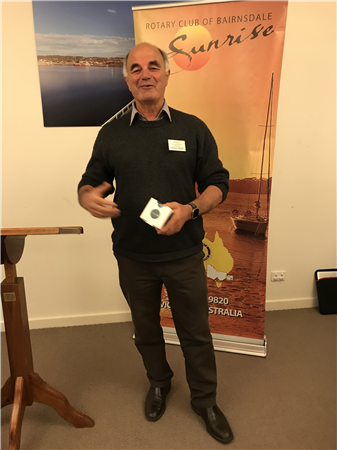Mike is a past president of Mitchell River RC. This is his third visit to RC Sunrise. The first was in 2004, just after Changing Lanes started. Changing Lanes is just completing 16 years, against all expectation. There is obviously an ongoing need to help young people in this community who find themselves socially, economically or educationally disengaged.
Changing Lanes is a 24/7 operation, and all the youngsters have Mike’s phone number and can (and do) contact him when they have need at any time.
It started when Mike was given the names of 150 disengaged youth in this region who weren’t involved with education and were on the streets or suchlike. After interviewing 51, he had to stop interviewing as only one was deemed unsuitable for the project. So Changing Lanes started at what is now the Hub, with 50 young people.
At that stage, they only took young people who were not attending school, and it was difficult to reengage them in education. Many had serious issues with antisocial behaviours, and most had a court record. Rod Wright (from our club) kept track over the first year and found recidivism amongst the Changing Lanes youth had reduced dramatically.
These days, Changing Lanes has become part of the Secondary College’s management strategy, and the nature of the youngsters attending Changing Lanes is quite different. There are a lot more mental health issues, and where marijuana was the main drug of choice, much more sinister substances are the problem now. And young people are now preyed upon by dealers much more than previously.
Ages are mainly 15-19, but this is flexible depending on individual needs. Mike is the only full time staff member, and there are about 6 part-time teachers. There are currently 37 students on the books, but only about 15 will usually attend at any time. Over a year, around 70 youngsters attend Changing Lanes. Some will be short-term via our crisis accommodation centre.
Mike organises Changing Lanes as a workplace, not a school. He negotiates a Workplace Agreement with each youngster, which they sign. They respect the buildings and contents of Changing Lanes. Respect for each other and staff is also expected. Literacy and numeracy are often a problem for disengaged youth, and there are daily lessons in these subjects for all students.
Although only a small percentage of our school students succeed at university, this is the focus of all our schools. Mike’s youngsters are often at the extreme end of the non-adacemic stream, and, sadly, many have learned from experience that it is socially more acceptable to “be a ratbag” than to be “dumb”. These young people have been adversely affected by the educational change from practical woodwork and metalwork subjects to today’s design technology.
Employment is the goal, and some of these young people are 2ndor 3rdgeneration unemployed. They can face ridicule from their families if they do find a job. They can be disdainful of a “menial” job, but Mike explains that any job is better than “smoking cigarettes and doing drugs” for a living, which is often the alternative.
Staff members often attend court sessions with the young people to support them. If a youngster gets it wrong at Changing Lanes, they will be sent away that day, but Mike sees tomorrow as a new day and a chance to return, start again and do better.
There was apparently a recent episode on a current affairs programme that, unfairly, put Changing Lanes in a bad light. This was very upsetting for Mike, his support staff and the students, although Mike was heartened by a wave of support from ex-participants in support of Changing Lanes and how it had changed their lives.
When asked what the community can do to support Changing Lanes, Mike commented that it has a tight budget, but it does get a lot more support from schools now. Financial help is always welcome, but his main requests of the community are for work placements, mentors and “don’t count it against a youngster if you find they are from Changing Lanes”.
HeadSpace and Lakes Entrance Community Health are both great supports, although Mike does sometimes need to use some influence to bypass waiting times.
Julie Backhouse, working with students with challenges at the Specialist School, pointed out that Changing Lanes is a very important part of education in our community. Julie Small thanked Mike for his work and his talk.

